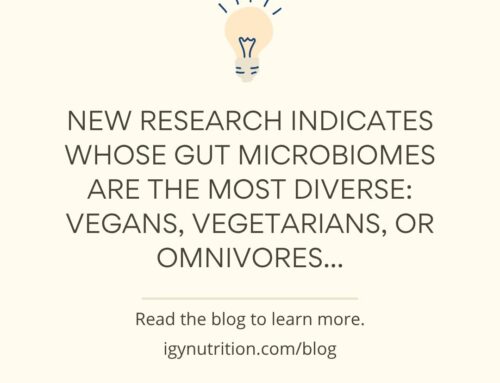A new study published in Nature Medicine asserts that gut testing the gut microbiome’s composition may be more accurate than testing calprotectin (a marker of gut inflammation) to diagnose patients with IBD (inflammatory bowel disease, like ulcerative colitis or Crohn’s) (Source).
By studying nearly 6,000 fecal samples from people across several different regions and ethnicities, they found that patients with IBD had significantly different microbiomes from healthy patients. They noted the ways in which the IBD patients’ microbiomes differed in hopes that altering their microbiomes to look more like that of a healthy patient could serve as an effective IBD treatment in the future. But these findings go far beyond that. They reveal how closely linked the microbiome is to inflammation in the gut.
The Microbiome and Its Role in IBD
IBD is a chronic condition that causes inflammation in the gastrointestinal tract, leading to symptoms like abdominal pain, diarrhea, and weight loss. While doctors have known for a while that IBD involves an abnormal immune response, this study shows that the gut microbiome plays a key role in triggering and sustaining that inflammation (Source).
Researchers identified several bacterial species that either thrive or disappear in the guts of people with IBD. For instance, people with IBD were found to have higher levels of harmful bacteria, like Escherichia coli and Bacteroides fragilis, which are known for their ability to promote inflammation. Conversely, beneficial bacteria that produce anti-inflammatory compounds—such as Faecalibacterium prausnitzii, Roseburia inulinivorans, and Ruminococcus torques—were significantly reduced in individuals with IBD.
The researchers found that this imbalance between harmful and helpful bacteria is a hallmark of IBD. The loss of bacteria that produce short-chain fatty acids, like butyrate, weakens the gut’s protective lining, making it easier for harmful bacteria to invade and cause inflammation. Essentially, the microbiome’s failure to regulate the immune system correctly seems to be one of the driving forces behind the chronic inflammation seen in IBD.
Ulcerative Colitis vs. Crohn’s Disease: Different Microbial Signatures
Interestingly, the researchers also found that UC and CD have different microbial “signatures.” People with UC showed increased counts of bacteria like Clostridium spiroforme and Gemella morbillorum, while individuals with CD had higher levels of E. coli and Actinomyces.
What’s fascinating is how these bacteria are thought to interact with the body’s immune system. In UC, the bacteria linked to the condition seem to promote inflammation by altering the gut’s immune response to its own cells. In CD, E. coli and Bacteroides fragilis—which can break down the protective mucus layer of the intestine—are more directly involved in breaching the gut lining and triggering a more aggressive inflammatory response.
These differences in microbial communities may help explain why UC and CD, while both forms of IBD, often have different symptoms and complications.
The Gut’s Relationship with Chronic Inflammation
The findings from this study reinforce the idea that the gut microbiome is not just a bystander in the development of diseases like IBD—it’s an active participant. The bacteria living in our intestines can either protect against inflammation or contribute to it, depending on which species are present and in what amounts.
For people with IBD, the gut microbiome is a key player in the ongoing inflammation that defines the disease. Harmful bacteria thrive in the gut and provoke the immune system, while beneficial bacteria that might counterbalance this response are diminished or missing altogether. This imbalance not only fuels inflammation but can also make it harder for the gut to heal, leading to a cycle of chronic disease.
A Deeper Look at Inflammation Through the Microbiome
This research is significant because it highlights the gut microbiome as a crucial mediator of inflammation. Scientists are beginning to realize that the bacteria in our guts don’t just coexist with us—they actively influence how our immune system functions, especially in the gut.
When the balance of good and bad bacteria shifts in the wrong direction, it creates a breeding ground for inflammation. The presence of pro-inflammatory bacteria like E. coli or Bacteroides is like constantly poking a wound, preventing the immune system from calming down. Meanwhile, the absence of anti-inflammatory bacteria means the immune system struggles to counteract the damage. This imbalance keeps the gut in a state of constant immune activation, which is precisely what happens in IBD.
This study gives us a clearer picture of how changes in gut testing in the microbiome can directly contribute to the long-term inflammation seen in IBD. It’s not just that inflammation leads to changes in the microbiome—the changes in the microbiome themselves may be what’s keeping the inflammatory cycle going.
These gut testing findings could lead to new treatments for IBD that focus on restoring the balance of bacteria in the gut rather than solely targeting the immune system. But for now, what we do know is that the microbiome’s role in inflammation is much more significant than we once thought.




